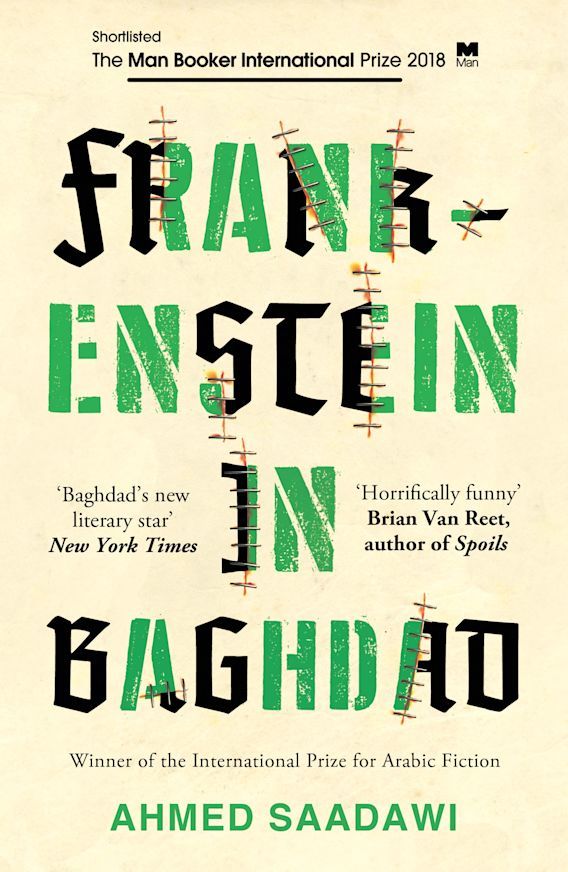Author: Ahmed Saadawi
Translator: Jonathan Wright
Published: 2013
Target audience: Adults (appropriate ages 17+)
"The explosion took place two minutes after Elishva, the old woman known as Umm Daniel, or Daniel's mother, boarded the bus."
From the rubble-strewn streets of war-torn Baghdad, Hadi the junk dealer has been collecting the leftover body parts from those killed in terrorist attacks, and stitching them together into one complete corpse. He claims to do this to force the government to recognise the parts as real people, and give the corpse a proper burial. At first, everyone dismisses Hadi's story as just another tall tale from the junk dealer. Between discontent journalists, feuding hotel owners, coffee shop gossips, and old Elishva's belief that one day her long lost son will come home, everyone in the neighbourhood has more important things on their minds.
But then the corpse goes missing, and a wave of violent, eerie homicides sweeps across the city. Reports flood in of a grotesque, murderous creature that cannot be killed. Known as the Whatsisname, the corpse has risen to enact brutal justice against criminals, especially those responsible for the deaths of the innocent victims that compose his body parts. At first it's only the guilty he attacks, but as the Whatsisname realises that he needs fresh body parts to continue his vengeful mission, soon anyone who crosses his path becomes a target...
First written in 2013 by Iraqi author Ahmed Saadawi, and translated into English in 2018 by Jonathan Wright, 'Frankenstein in Baghdad' is a gothic fiction novel that explores the surreal everyday experience of living in a city at war. The story takes place in 2004-2005, in the instability of Iraq following the aftermath of the US invasion that left the country in an uncertain transitional state. Through the perspectives of elderly Elishva and her evening prayers, the investigations of ambitious journalist Mahmoud al-Sawadi, the changeable accounts of Hadi the junk dealer, and a myriad of other interwoven perspectives, Saadawi creates a intricate, multi-faceted glimpse into the lives of ordinary people during the turbulent Iraq War era.
Against this backdrop of political and social tension, the Whatsisname emerges to question the possibility of achieving peace or justice in a country torn apart by terrorists and sectarian violence. With the vengeful actions of the Whatsisname at the nexus of the novel, Saadawi fosters an interplay between normalcy and pervasive turmoil to examine the cyclical nature of violence, the corruptibility of ideals, and the complicit legacy of war.
'Frankenstein in Baghdad' is a fascinating, insightful read, yet its appeal and accessibility to readers may be adversely affected by the novel's marketing. Despite being advertised as a "wickedly funny" story rife with "black humour", very few moments in 'Frankenstein in Baghdad' might be described as comedic. Similarly, although the novel is touted as a tense horror story, it may be more accurately labeled as gothic fiction due to Saadawi's use of supernatural elements and allegory as a vehicle for social and political critique, rather than to inspire fear or disgust. Consequently, readers picking up 'Frankenstein in Baghdad' looking for a jocular story or chilling tale may feel disappointed or mislead, which may negatively impact their desire to continue engaging with the novel.
Nevertheless, 'Frankenstein in Baghdad' remains an exceptional novel, deservedly winning the International Prize for Arabic Fiction in 2014 and being shortlisted for 2018 The Man Booker International Prize. I strongly recommend giving this unique and compelling story a read.
Excerpt:
He knew his mission was essentially to kill, to kill new people every day, but he no longer had a clear idea of who should be killed or why. The flesh of innocents, of which he was initially composed, had been replaced by new flesh, that of his own victims and criminals. He thought if he took too long avenging the victims in whose name he was acting, the body parts he had taken from them would decompose in situ. It would be the end of him, and he would be free of this world.
